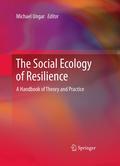
The social ecology of resilience: a handbook of theory and practice
Ungar, Michael
More than two decades after Michael Rutter (1987) published his summary of protective processes associated with resilience, researchers continue to report definitional ambiguity in how to define and operationalize positive development under adversity. The problem has been partially the result of a dominant view of resilience as something individuals have , rather than as a process that families, schools,communities and governments facilitate. Because resilience is related to the presence of social risk factors, there is a need for an ecological interpretation of the construct that acknowledges the importance of people’s interactions with their environments. The Social Ecology of Resilience provides evidence for this ecological understanding of resilience in ways that help to resolve both definition and measurement problems. Offers an ecological basis for understanding resilience. Provides a comprehensive look at how culture and context affect positive outcomes to adverse circumstances. Includes contributions from renowned international scholars. Considers both Western and non-Western approaches. INDICE: I. Introduction to the Theory.-Social Ecologies and their Contribution to Resilience.-Resilience: Causal Pathways and Social Ecology.-Theory andMeasurement of Resilience: Views from Development.-Resilience and Children's Work in Brazil: Lesson from Physics for Psychology.-II. Five Interviews.-An Interview with Macalane Malindi: The Impact of Education and Changing Social Policy on Resilience During Apartheid and Post-Apartheid in South Africa.-An Interview with Bill Strickland: How Community-based Adult Educational Facilities can Lift People out of Poverty in Urban America.-An Interview with Jude Simpson: Growing Beyond a Life of Abuse and Gang Involvement in New Zealand.-An Interview with Vicki Durrant: Creating a Community Program for High-Risk AboriginalYouth in Canada's North.-An Interview with Arn Chorn-Pond: Helping Children in Cambodia Through the Revival of Traditional Music and Art.-III. The Individual (in context).-From Neurons to Social Context: Restoring Resilience as a Capacity for Good Survival.-Situating Resilience in Developmental Context.-Temporal and Contextual Dimensions to Individual Positive Development: A Developmental-Contextual Systems Model of Resilience.-Girls' Violence: Criminality or Resilience?-IV. The Family.-Facilitating Family Resilience: Relational Resources for Positive Youth Development in Conditions of Adversity.-Contexts of Vulnerability and Resilience: Childhood Maltreatment, Cognitive Functioning and CloseRelationships.-Averting Child Maltreatment: Individual, Economic, Social and Community Resources that Promote Resilient Parenting.-Caring Relationships: How to Promote Resilience in Challenging Times.-Young People, Their Families andSocial Supports: Understanding Resilience with Complexity Theory.-V. The School.-Local Resources and Distal Decisions: The Political Ecology of Resilience.-Caring Teachers: Teacher-youth Transactions to Promote Resilience.-Children with Disabilities and Supportive School Ecologies.-Resilience in Schools and Curriculum Design.-VI. The Community.-How Prior Social Ecologies Shape Family Resilience Amongst Refugees in U.S.Resettlement.-Young People, Sexual Orientation, and Resilience.-Community Resilience: Fostering Recovery, Sustainability, and Growth.-The Social Ecology of Resilience in War-Affected Youth: A Longitudinal Study from Sierra Leone.-Traveling Through Social Support and Youth Civic Action on a Journey Towards Resilience.-VII. Culture.-Understanding Culture and Resilience: The Production of Hope. Case Study: Promoting Community Resilience with Local Values? Greenland's Paamiut Asasara.-Toward an Ecology of Stories: Indigenous Perspectives on Resilience.-Macro, Meso and Micro Perspectives of Resilience During and After Exposure to War.-Predictors of resilient psychosocial functioning in Western Australian Aboriginal Young People Exposed to High Family-level Risk
- ISBN: 978-1-4614-0585-6
- Editorial: Springer New York
- Encuadernacion: Cartoné
- Páginas: 700
- Fecha Publicación: 28/11/2011
- Nº Volúmenes: 1
- Idioma: Inglés
